NIO ET7 vs Hyundai Inster – Differences & prices compared
Everyday use, family trips or long-distance drives – here’s where the differences show.
Discover whether NIO ET7 or Hyundai Inster fits your lifestyle better.
Costs and Efficiency:
Price and efficiency are often the first things buyers look at. Here it becomes clear which model has the long-term edge – whether at the pump, the plug, or in purchase price.
Hyundai Inster has a clearly advantage in terms of price – it starts at 20500 £, while the NIO ET7 costs 59900 £. That’s a price difference of around 39429 £.
In terms of energy consumption, the advantage goes to the Hyundai Inster: with 14.30 kWh per 100 km, it’s clearly perceptible more efficient than the NIO ET7 with 19 kWh. That’s a difference of about 4.70 kWh.
As for range, the NIO ET7 performs noticeable better – achieving up to 584 km, about 214 km more than the Hyundai Inster.
Engine and Performance:
Under the bonnet, it becomes clear which model is tuned for sportiness and which one takes the lead when you hit the accelerator.
When it comes to engine power, the NIO ET7 has a convincingly edge – offering 653 HP compared to 115 HP. That’s roughly 538 HP more horsepower.
In acceleration from 0 to 100 km/h, the NIO ET7 is convincingly quicker – completing the sprint in 3.80 s, while the Hyundai Inster takes 10.60 s. That’s about 6.80 s faster.
In terms of top speed, the NIO ET7 performs noticeable better – reaching 200 km/h, while the Hyundai Inster tops out at 150 km/h. The difference is around 50 km/h.
There’s also a difference in torque: NIO ET7 pulls significantly stronger with 850 Nm compared to 147 Nm. That’s about 703 Nm difference.
Space and Everyday Use:
Whether family car or daily driver – which one offers more room, flexibility and comfort?
Seats: NIO ET7 offers somewhat more seating capacity – 5 vs 4.
In curb weight, Hyundai Inster is decisively lighter – 1380 kg compared to 2434 kg. The difference is around 1054 kg.
In terms of boot space, the NIO ET7 offers noticeable more room – 363 L compared to 280 L. That’s a difference of about 83 L.
When it comes to payload, NIO ET7 distinct takes the win – 466 kg compared to 357 kg. That’s a difference of about 109 kg.
Who wins the race?
The NIO ET7 proves to be is largely superior and therefore becomes our DriveDuel Champion!
NIO ET7 is the better all-rounder in this comparison.

NIO ET7
NIO ET7
The ET7, NIO's premium electric sedan, combines cutting-edge technology with luxurious comfort to create a remarkable driving experience. Its sleek design is not only visually captivating but also enhances aerodynamic efficiency, contributing to its impressive performance. With a focus on sustainability, the ET7 promises to redefine the landscape of electric mobility with its innovative features and environmentally-friendly credentials.
details @ NIO
@ NIO
 @ NIO
@ NIO
 @ NIO
@ NIO
Hyundai Inster
The Inster has quickly captured the attention of automotive enthusiasts with its striking design and dynamic performance. This model seamlessly blends advanced technology with comfort, making it an ideal choice for both daily commutes and adventurous road trips. With its spacious interior and innovative features, the Inster promises an exhilarating driving experience that doesn’t compromise on practicality.
details @ hyundai.news
@ hyundai.news
 @ hyundai.news
@ hyundai.news
 @ hyundai.news
@ hyundai.news

|

|
|
|
|
Costs and Consumption |
|
|---|---|
|
Price
59900 - 68900 £
|
Price
20500 - 25800 £
|
|
Consumption L/100km
-
|
Consumption L/100km
-
|
|
Consumption kWh/100km
19 - 19.3 kWh
|
Consumption kWh/100km
14.3 - 15.1 kWh
|
|
Electric Range
451 - 584 km
|
Electric Range
327 - 370 km
|
|
Battery Capacity
73.5 - 90 kWh
|
Battery Capacity
42 - 49 kWh
|
|
co2
0 g/km
|
co2
0 g/km
|
|
Fuel tank capacity
-
|
Fuel tank capacity
-
|
Dimensions and Body |
|
|---|---|
|
Body Type
Sedan
|
Body Type
SUV
|
|
Seats
5
|
Seats
4
|
|
Doors
4
|
Doors
5
|
|
Curb weight
2434 - 2454 kg
|
Curb weight
1380 - 1433 kg
|
|
Trunk capacity
363 L
|
Trunk capacity
238 - 280 L
|
|
Length
5101 mm
|
Length
3825 - 3845 mm
|
|
Width
1987 mm
|
Width
1610 mm
|
|
Height
1509 mm
|
Height
1575 - 1610 mm
|
|
Max trunk capacity
-
|
Max trunk capacity
1059 L
|
|
Payload
446 - 466 kg
|
Payload
317 - 357 kg
|
Engine and Performance |
|
|---|---|
|
Engine Type
Electric
|
Engine Type
Electric
|
|
Transmission
Automatic
|
Transmission
Automatic
|
|
Transmission Detail
Reduction Gearbox
|
Transmission Detail
Reduction Gearbox
|
|
Drive Type
All-Wheel Drive
|
Drive Type
Front-Wheel Drive
|
|
Power HP
653 HP
|
Power HP
97 - 115 HP
|
|
Acceleration 0-100km/h
3.80 s
|
Acceleration 0-100km/h
10.6 - 11.7 s
|
|
Max Speed
200 km/h
|
Max Speed
140 - 150 km/h
|
|
Torque
850 Nm
|
Torque
147 Nm
|
|
Number of Cylinders
-
|
Number of Cylinders
-
|
|
Power kW
480 kW
|
Power kW
71 - 85 kW
|
|
Engine capacity
-
|
Engine capacity
-
|
General |
|
|---|---|
|
Model Year
2022
|
Model Year
2025
|
|
CO2 Efficiency Class
A
|
CO2 Efficiency Class
A
|
|
Brand
NIO
|
Brand
Hyundai
|
Is the NIO ET7 offered with different drivetrains?
The NIO ET7 is offered with All-Wheel Drive.
The prices and data displayed are estimates based on German list prices and may vary by country. This information is not legally binding.
